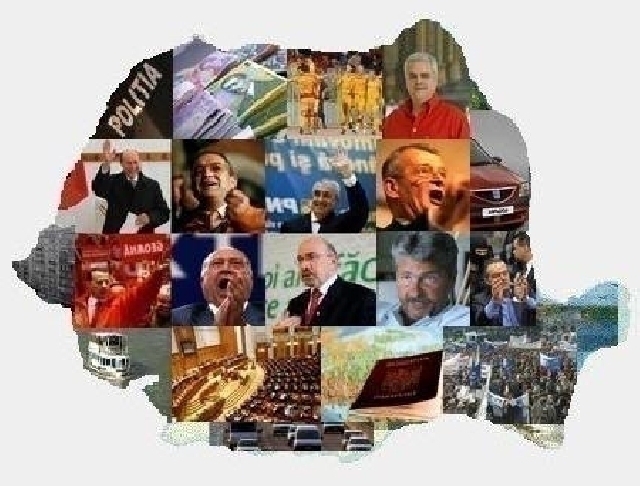The Year 2014 in International Politics
A roundup of the year's main stories

România Internațional, 27.12.2014, 15:10
The Ukrainian crisis and the new Cold War
Pundits and political leaders alike see 2014 as the year that marked the beginning of a new Cold War. The fall, in January, of the pro-Russian regime in Kiev, following violent protests that ended in the ousting of president Viktor Yanukovych and brought along a pro-western administration, was followed by Russia’s violent reaction. Remarkable in terms of cynicism and effectiveness, Crimea’s non-violent annexation by Russia in March, proved to be only the tip of the iceberg. The political and military support of the pro-Russian secessionist rebellion in eastern Ukraine followed, claiming the life of 4 thousand people. Among them are collateral victims, such as the 300 passengers of an airliner blown up by the separatists’ artillery. These tragic developments prompted the international community to admit to a rebirth, under the leadership of Vladimir Putin, of Russia’s insatiable appetite for new territories, in a typical Stalinist manner. The United States, the European Union and their partners from the free world, from Canada to Australia, tried to oppose it by using political and economic weapons. Concerned with the evolutions in Ukraine, one of its biggest neighbors in demographic and territorial terms, Romania, an Eastern outpost of the EU and NATO, has called on its western allies to increase their military presence in the region. Romania has repeatedly and firmly stated its support for the sovereignty and territorial integrity of Ukraine, which is home to almost half a million Romanians.
Electoral victories of pro-Europeans in Kiev and Chisinau
Voters in both Ukraine and the Republic of Moldova have proved their support for the European bid of these former Soviet republics, which signed association and free trade agreements with Brussels. The only decisive element in a democracy – the elections’ result dismisses Russia’s rhetoric of alleged rights over its former colonies. The pro-Western tycoon Petro Poroshenko was elected president of Ukraine while the pro-Russians became a minority in the country’s Parliament, after the legislative elections. Moreover, it is the first time after 1991, when the country became independent, that the communists were unable to exceed the 5% electoral threshold that they needed in order to make it to Parliament. In Chisinau the pro-Russian communists, socialists and populists lost the elections as well. The so-called Alliance for the European Integration, formed ever since 2009, made up of Liberal Democrats, Democrats and Liberals, on November 30 won for the second time in a row most parliamentary seats and will continue to rule the Republic of Moldova. Moldovan political leaders hope their country will become an EU candidate in 2017 and a full member in 2020. Romania, a staunch supporter of Moldova’s EU integration, given their common language, history, culture and destiny, was the first to hail the victory the pro-Europeans in the neighbouring state.
European Elections
May’s European elections confirmed the supremacy of democratic ideologies on the continent, the European People’s Party, the socialists and the liberals, who won two thirds of the mandates. The elections have also raised concerns about the revival, in almost all EU countries, of a discriminatory and anti-migration rhetoric. From Hungary to France and from Greece to the Netherlands, parties perceived as Euroskeptic,, not to say anti-European, sent their representatives in the European Parliament. Romania is not represented in Strasbourg and Brussels by any populist or xenophobic MEP. The 32 seats assigned to Romania went to parties affiliated with the large European groups promoting European values. Representing the left wing is the Social Democratic Party, in power in Romania, who are part of the family of European socialists and the National Liberal party, representing the right wing, which this year have switched from being members of the Alliance of Liberals and Democrats to the European’s People Party (EPP), just like the Liberal Democratic Party, the People’s Movement Party and the Democratic Union of Ethnic Hungarians in Romania, already members of the group.
Changes at the top of the European institutions
Supported by his fellow Socialists and the European People’s Party, the German Martin Schultz has been reelected at the helm of the European Parliament for another two years and a half. According to an agreement between the two parties, a representative of the People’s Party will head the European legislative body for a similar period of time. After having led the European Commission for ten years, which during his mandate saw the most extensive enlargement towards the east and the south in the Union’s history, the Portuguese Jose Manuel Barroso has been replaced this autumn, by the Luxembourger Jean-Claude Juncker. In his turn, the Polish Donald Tusk is the first East European president of the Council of Europe, having replaced the Belgian Herman Van Rompuy who previously held this office. Also, Italian Federica Mogherini will lead the EU’s foreign policy for the next five years, a position left vacant by Catherine Ashton of Britain. Romania’s representative in the new European Commission is the former Social Democrat MP Corina Cretu, who now holds the regional policy portfolio. After its EU accession in 2007, Romania has in turn held the portfolios of multilingualism, headed by Leonard Orban and that of Agriculture, headed by Dacian Ciolos.
Hot Topics on NATO’s Agenda
NATO has a new secretary general as of this autumn. Former Norwegian PM Jens Stoltenberg has taken over this position from the Danish Anders Fogh Rasmussen. The new secretary general will have to deal with two major issues: the problematic ties with Russia and increased security measures for NATO allies on the eastern flank, Romania included, and the crisis in the Middle East, an area threatened by the Jihadist movement which local governments, highly ineffective, weak and corrupt, seem unable to cope with. Large territories in Syria and Iraq have been under the control of the self-proclaimed Islamic State terrorist group ever since this summer.





























